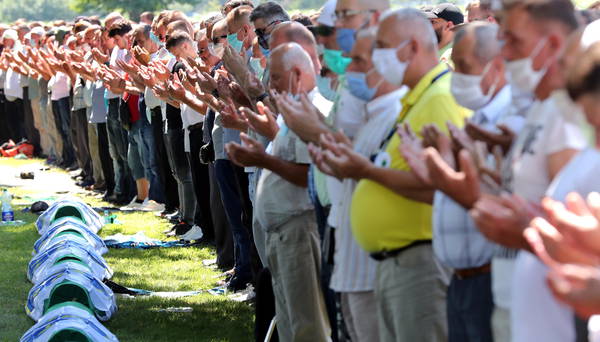(ANSA-AFP) - SREBRENICA, 11 JUL - Bosnian Muslims on
Saturday mark 25 years since the Srebrenica massacre, the worst
atrocity on European soil since World War II, with the memorial
ceremony sharply reduced as a result of the coronavirus
pandemic. Organisers said the number of people attending the
anniversary -- usually in the tens of thousands -- is likely to
be lower than usual because of lockdown measures aimed at
stemming the spread of COVID-19. Proceedings are scheduled to
start in the morning. Then, at 1100 GMT, the remains of nine
victims identified over the past year will be laid to rest at
the memorial cemetery in Potocari, a village just outside
Srebrenica that served as the base for the UN protection force,
FORPRONU, during the conflict. On July 11, 1995, after capturing
the ill-fated town, Serb forces killed more than 8,000 Muslim
men and boys in Srebrenica in a few days. The episode --
labelled as genocide by two international courts -- came at the
end of a 1992-1995 war between Bosnia's Croats, Muslims and
Serbs that claimed some 100,000 lives. So far, the remains of
nearly 6,900 victims have been found and identified from more
than 80 mass graves. Bosnian Serb wartime military chief general
Ratko Mladic, still revered as a hero by many Serbs, was
sentenced to life in prison by a UN court in 2017 over war
crimes including the Srebrenica genocide. He is awaiting the
decision on his appeal. Radovan Karadzic, another Bosnian Serb
wartime political leader, was also sentenced to life in prison
in The Hague. - War against denial - The Srebrenica massacre is
the only episode of the Bosnian conflict to be described as
genocide by the international community. And while for Bosnian
Muslims recognising the scale of the atrocity is a necessity for
lasting peace, for most Serbs -- leaders and laypeople in both
Bosnia and Serbia -- the use of the word genocide remains
unacceptable. In the run-up to the anniversary, Serbian
President Aleksandar Vucic described Srebrenica as "something
that we should not and cannot be proud of", but he has never
publicly uttered the word "genocide". (ANSA-AFP). (ANSA).
© Copyright ANSA - All rights reserved














